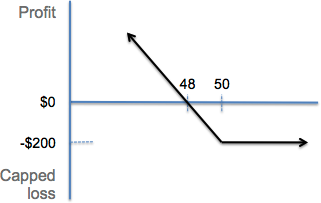Long Put, Long a Put Option
What does it Mean to be Long a Put?
Related Terms:
- Long A Call
- What are Options?
- What is a Call?
- What is a Put?
- How To Buy A Call
- At-The-Money
- In-The-Money
- In The Money Put
- Out-Of-The-Money
Definition of Long Put:
An investor is said to be long a put option when he has purchased a put option and currently owns the put. The term "going long" refers to buying a security, and applies to being long a stock, long a call, and long a put. When you are long a put you are hoping that the price of the underlying stock or index falls below the strike price of the put option. When the stock price is above the strike price, the long put option is "out of the money." When the stock price is at the strike price, the long put option is "at the money." And when the stock price is below the strike price, the long put option is "in the money."
Long Put Example

Being long a put option is the opposite of being "short a put." The person that buys the put option has a long position, but the person that sold or wrote the put is "short a put."
The person that is "long a put" wants the stock price to fall to $0 so that his profit is maximized. The person that is sold or wrote the put and is "short a put" wants the stock price to stay at or go above the strike price so that the put option expires worthless.
Example of being Long a Put: Suppose YHOO is at $40 and you think YHOO's stock price is going to go down to $40 in the next few weeks. One way to profit from this expectation is to buy the YHOO 40 Put option. Once you own the YHOO $40 put option, you are said to be "long a put" on YHOO. The seller of the YHOO put option, from whom you purchased it, is said to be "short a put."
Call and Put Option Trading Tip: It is best to be long a put when you expect a big drop in the underlying stock price. The biggest price movements on a percentage basis generally come around the time that the company releases its earnings. Four times a year companies release their quarterly financial statements. If you think a company is going to release very poor earnings, then go long a put!

Here are the top 10 option concepts you should understand before making your first real trade: